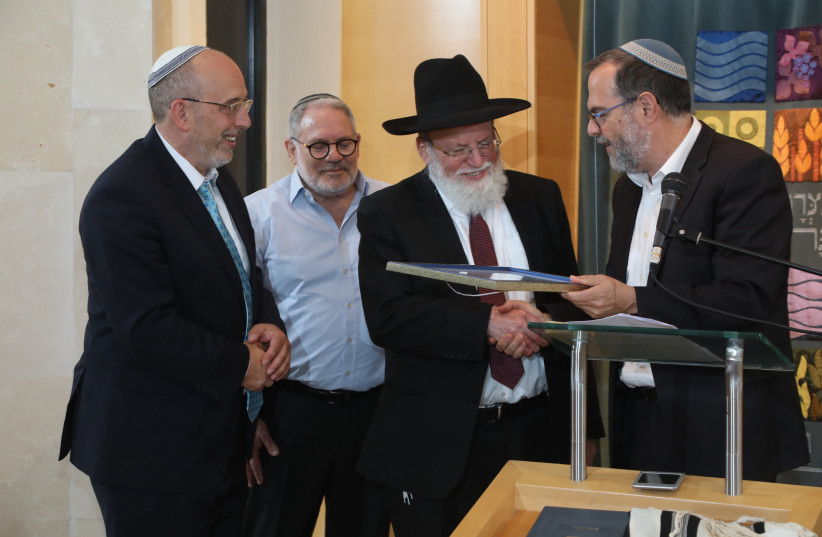A few weeks ago, an important event was played out to great fanfare when Zionists from around the world descended on Basel to celebrate 125 years since the First Zionist Congress where the Basel Platform was released, which set out the goals of the modern Zionist movement.
For religious Zionists, this was, of course, an important event, but the platform and its goals laid out in 1897 were neither new, unique nor groundbreaking.
Ever since Abraham was told by God to go to the Land of Israel thousands of years ago, the people of Israel have faced it as the repository of its national aspirations.
The central message about religious Zionism
The Bible is many things, but at its core, its central message is about religious Zionism. It instills a religious yearning for the Land of Israel as the national, ancestral and indigenous homeland of the Jewish people.

The Talmud, the Rishonim and the Achronim commentators were all religious Zionists, whether it was the myriad of teachings that Judaism can only be kept fully in Israel, Rabbi Yehudah Halevy’s famous poem today, “My Heart is in the East,” or Rabbi Moses ben Nachman, known as Nachmanides and also referred to by the acronym Ramban who wrote in Hasagot Ha’ramban on the Rambam’s definitive Sefer Hamitzvot, that “we have been commanded to take possession of the land and dwell in it. If so, it is a positive precept for all generations, binding upon every individual, even during the period of the exile, as is clear from many places in the Talmud.”
It was the Religious Zionist who held the flame of the yearning for the land aloft throughout the difficult millennia of exile.
Even Theodor Herzl himself gained his understanding of Zionism from his grandfather who was a student of Rabbi Judah ben Solomon Chai Alkalai, who himself was a student of Rabbi Yehuda Aryeh Leon Bibas, who laid out the first modern Zionist platform based on Jewish tradition and teachings half a century before Basel.
Thus, Zionism was never truly secular and distanced from Jewish tradition, even if some of its opponents attempted to make that case to justify their disapproval.
Movement for reestablishing the Jewish sovereignty
With the movement for the reestablishment of Jewish sovereignty gathering pace in the 19th and 20th centuries, the religious Zionists had an important role to play to ensure that such disparate groups such as the modern secular pioneers were imbued with Jewish identity, and there was a strong bridge built between differing outlooks and worlds among the Jewish Yishuv living under Ottoman and British rule.
With the teaching of some of its luminous leaders in the 20th century like Rabbi Abraham Isaac Kook and Rabbi Ben-Zion Meir Hai Uziel, religious Zionists played a role in every aspect and facet of nation and community building.
Religious Zionism was thus always an ancient mission, rather than a sectoral outlook.
Today, religious Zionists span the spectrum from those who consider themselves traditional Jews who have great respect for their tradition to fervently Orthodox Jews. They form the bedrock of many of the most elite IDF combat units, created universities, led our intelligence agencies and sit on the Supreme Court.
While some want to remove more and more Jewish traditions from the State of Israel, like the attempt to move increasingly away from the Shabbat as a day of rest in our country, the majority of Israelis today want the State of Israel to maintain its Jewish identity.
The number of those who are staunchly secular is shrinking, replaced by an increasingly traditional and religious public, who understand that there is a need for the State of Israel to be unlike just any other nation.
That is why it is so vital that religious Zionists continue to have a seat at the table and be a part of the decision-making process.
From the beginning of the state in 1948, religious Zionists were almost always part of every government, working together with secular, traditional and religious alike for the benefit of the nation and its people.
That tradition must continue
For many Israelis, the role of the religious Zionism is narrowly conceived as being solely related to issues of land and the military response to our enemies but it is so much more than that.
Religious Zionism is part of the glue that binds our society together, it is an outlook that brings people together in the spirit of Judaism and Zionism. It expresses immense pride and joy at our national achievements and steps up to provide the next generation of pioneers in each and every field necessary for the sustenance of our country.
For all of these reasons, and many more, the Religious Zionist Party needs to be the home of all those who care about preserving the Jewish identity of Israel.
It is the only party that places the importance of Israel’s national identity at the forefront.
It is the only party that proudly flies the flag of an ancient Zionism that is ever so relevant today.
It is the only party that balances the needs and requirements of all Israelis from the position of our Jewish tradition.
It is this Jewish tradition that needs a strong representation in the next Knesset.
The writer is a candidate for the 25th Knesset on the list of the Religious Zionist Party, founder and dean of the Barkai Center for Practical Rabbinics and Community Development and was formerly a rabbi in Kansas City and Milwaukee.
